Lauren Boebert abandoned her district and voters are rejoicing
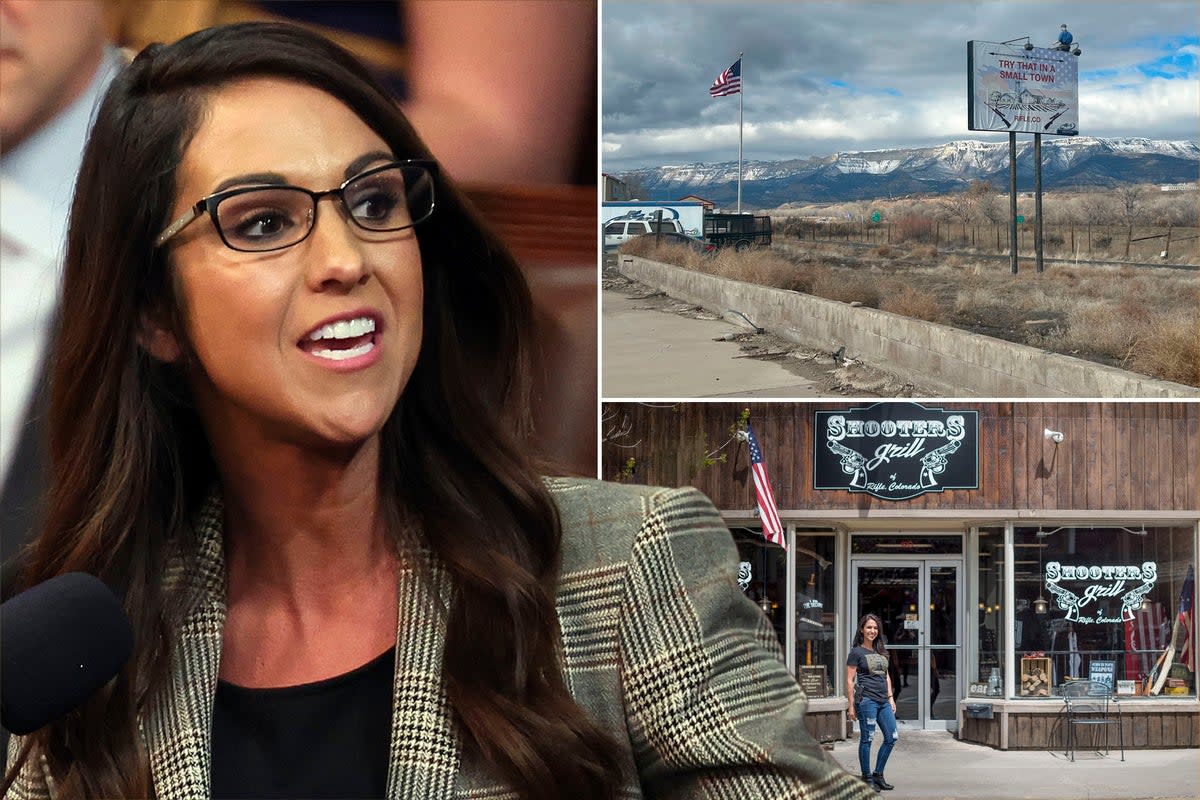
The McDonald’s just off I-70 looms nearly as large in small-town Rifle life as it does in Rep. Lauren Boebert’s origin story. The Republican provocateur quit high school for a shift manager position here – to her mother’s horror, she writes in her memoir – and it’s also where at 16 she met her now-ex-husband, Jayson, then 22.
But on this sunny Friday, as diners flit in and out just before noon, the teen behind the cash register has no idea a congresswoman ever worked here. Less than a mile away, past two roundabouts and across the Colorado River, not a single constituent turns up at the mobile office hours held by Boebert’s staff at the library. And Shooters Grill, her former restaurant around the corner – famed for gun-strapped waitresses and a food poisoning scandal – has been replaced by a swankier Mexican eatery.
The long shadow cast by Boebert over Western Colorado is beginning to vanish in her backyard. And many within her constituency say that it can’t happen fast enough.
“She’s always in drama here in Rifle and Silt,” one 66-year-old, born and raised in the 3rd congressional district, tells The Independent as she lunches with her two young grandchildren in the McDonald’s play area.
“She’s not the most popular person anymore,” says the grandmother – who, like most people in the area, refers to Boebert just as “Lauren” and asks to remain anonymous while speaking about her.
That, it seems, is an understatement.
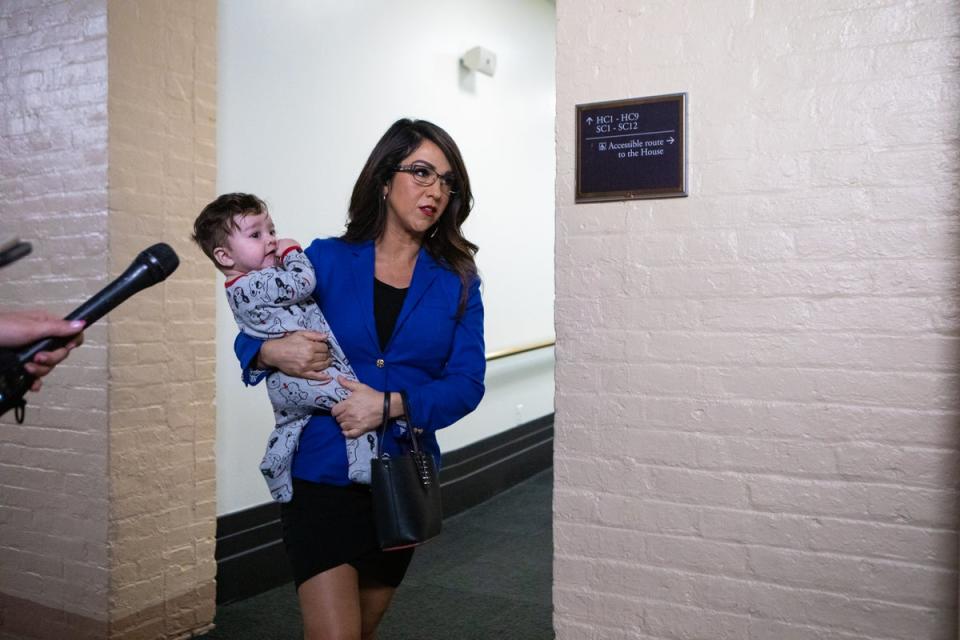
“There are people I know that are Trump supporters that don’t support her, and they started out, like, ‘Yeah, ra, ra, ra,’ and now, they’re just embarrassed – because she just makes a fool out of herself,” one 40-year-old unaffiliated voter tells The Independent in New Castle, the next town over from Silt. “When she comes to public places around here, it’s just not professional.”
She says the congresswoman “causes all this ruckus for no reason and doesn’t actually do anything in her position. I can’t think of anything that she’s actually done.”
It’s a common refrain from constituents represented by the 37-year-old new grandmother, who has endured a spectacular rise and fall between her home turf and DC. A Democrat briefly until 2008, she first came to power in a shock 2020 upset, riding a MAGA wave of rural Colorado libertarianism and covid restriction backlash to victory over five-term incumbent Republican Scott Tipton. Boebert tapped into the fringe elements of the right, weaving Christian nationalism and conspiracy theory bait into her unique brand of Trump-tinted braggadocio, and it played well for a time … before she seems to have taken it too far.
That much was evident when Adam Frisch, a former Independent running as a moderate Democrat, nearly beat her in 2022. Boebert scraped by with just 546 more votes after a mandated recount, a mortifying wakeup call for the congresswoman and her party – but her expected 2024 rematch with Frisch was shaping up to be yet another epic contest.
Boebert had Republican challengers for the primary but almost surely would have taken the nomination; Frisch was better bankrolled, ultra-determined and bolstered by a hell of a lot more name recognition than he’d enjoyed the first time around.
Then came the Beetlejuice bonanza of September, when Boebert was thrown out of a musical performance in Denver for vaping, groping her date and other bad behaviour. She blamed it on her divorce and apologised, but the hardline conservative and Christian voters she courted were horrified, and they were just about the last holdouts in her corner.
“She embraced a very religious, conservative perspective, but then her Beetlejuice night basically made her appear to be very hypocritical … and that’s where a lot of people began really, really questioning not just her judgement, but who she really was,” Republican State Rep. Matt Soper tells The Independent. “And, as a politician, the last thing you want to be questioned on is who you are.”
Less than three months later, in a social media announcement just after Christmas, Boebert announced she was dropping out of the CD3 race and switching to CD4, an even more heavily Republican district on the opposite side of Colorado.
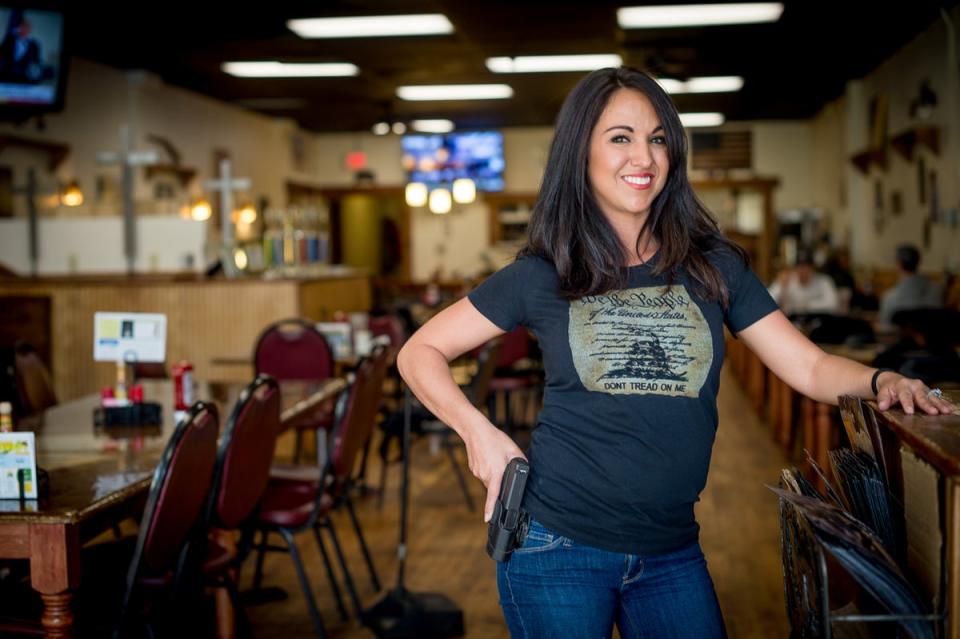
She’s not exactly being welcomed there, but her shock departure from CD3 has certainly changed the energy among her constituents – and those now vying for the seat.
“It really shook foundations and the dynamics in the race,” Justin Gollob, a political science professor at Colorado Mesa University, tells The Independent.
“Her exit really changed the message,” he continues. “This was an election largely based on a referendum of Lauren Boebert – and now it’s become a much more meat-and-potatoes issue, where Republicans gain an advantage within the district and Democrats have to figure a way how to chip away at that advantage through retail politics and focusing on issues that resonate with voters.”
Frisch, for one, gleefully released a statement immediately after Boebert’s district swap announcement, gloating that she was “running scared.” He told The Independent last weekend, as he campaigned across CD3’s massive land area, that he’d only learned of her exit “about an hour before it became public.”
“One of many reasons why I ran was to see her pack her bags out of the district, and so we are proud of doing that, and we’re excited about that,” he said. “That whole circus of her own personal stuff has now left the building, left the district, and one of the things I’ve been trying to do from Day One is try to tell why people should be voting for us, not against anyone specifically – that, again, this is not Team Red or Team Blue, this is Team CD3 – and focus on Colorado water, Colorado jobs, Colorado domestic energy.”
Such a return to more locally-focused issues, however, also presents a massive opportunity for Republicans on the Western Slope (the part of the state west of the Continental Divide, where bodies of water flow to the Pacific, not southeast towards the Gulf of Mexico) where voters tend to lean conservative, with many eager and willing to vote for the right – just not for Boebert.
“People on the Western Slope, they want a rugged, individual member of Congress, but they also have respect for the office and respect for the job,” Republican State Rep. Matt Soper, who considered throwing his hat into the CD3 race, tells The Independent.
He says the Beetlejuice incident deeply rattled her base, but CD3 Republicans tend to be “forgiving” – though her district switch announcement shattered what was left of that.
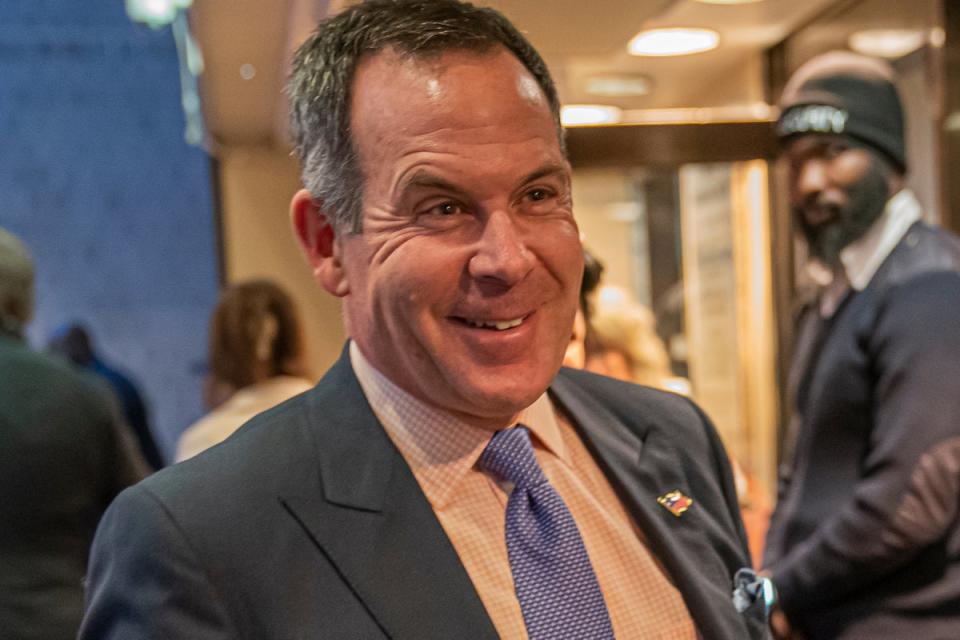
“They were so offended by the fact that she just basically bailed from the ship,” he says.
“She abandoned her duties. When the going got tough, she just left, and she behaved like a carpetbagger, moving from one district to another. And I will tell you that, on the Western Slope, that is one thing that’s not tolerated.”
He adds: “I have yet to run into any Republican who’s like, ‘Yeah, she did it for the good of the party, she’s going to allow us to retain the Third and, if we’re lucky, we’ll get her elected to the Fourth.”
Another Republican, a CD3 campaign operative, echoes him almost word-for-word.
“I have not heard a single person who’s said she’s done it for the good of the party,” he tells The Independent. “I have not heard that from the furthest-right, conspiracy theory, crazy MAGA person to the furthest-left, crazy … left-wing person. Nobody believes that that’s why she did it.”
The Republicans now running for the party nomination before the June primary range across the spectrum of GOP beliefs. The seeming frontrunner at the minute, whose fundraising had been nipping at Boebert’s heels, is a lawyer from Grand Junction whose image is the opposite of inflammatory. Jeff Hurd’s campaign site describes him rather unexcitingly as a “Colorado native, a husband, a father of five, and an attorney committed to serving his community and improving life in Colorado.”
Hurd has a long list of dyed-in-the-wool CD3 Republicans endorsing him on the site; he’s more the “establishment” candidate, as Soper puts it. Supporting that, Hurd’s campaign site takes a pointed swipe at Boebert and the taste she left in voters’ mouths, adding that the district needs a representative who will focus more “on doing something than being someone.”
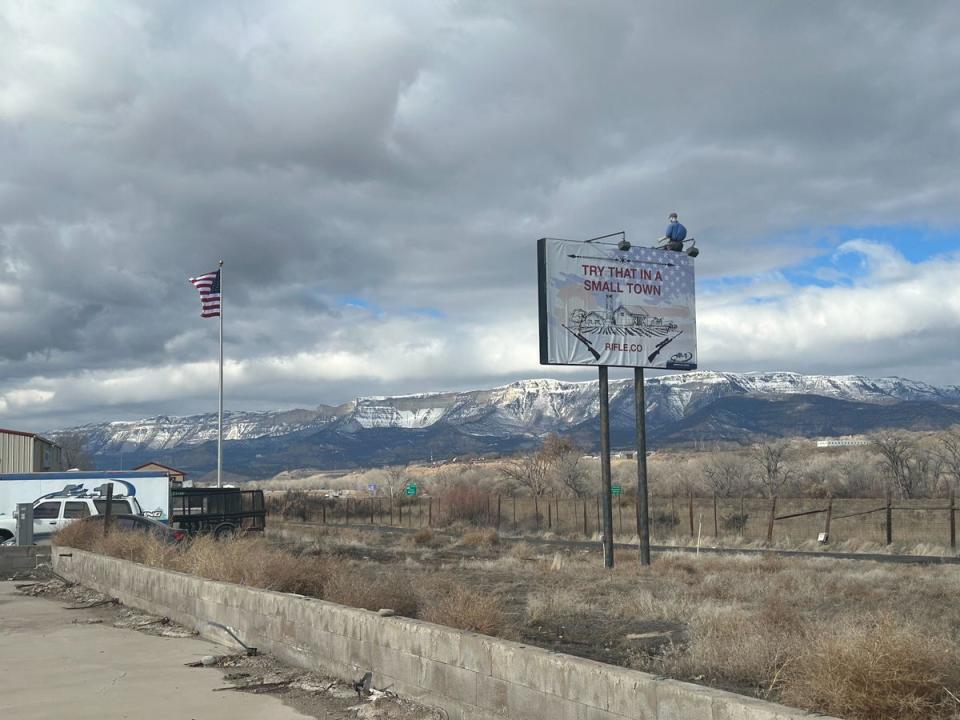
On the other hand, however, Boebert’s initial rise to power proved that some CD3 constituents do have an appetite for an in-your-face, gun-toting firebrand – just one who’ll back that up with legislative action. A veritable Boebert 2.0 has popped up to fill that slot, with Jan. 6 attendee Ron Hanks announcing days after the incumbent’s district swap that he would join the race for the GOP nomination.
The Air Force veteran, who unsuccessfully ran for Senate in 2022 with an ad depicting him blowing up a fake voting machine, calls himself a “pro-Trump warrior” and issued a written statement announcing his CD3 candidacy that could have been ripped out of Boebert’s playbook, the rhetoric railing against RINOs (Republicans In Name Only) and quips like “the danger is real” and “I cannot stand idly by.”
Hanks shares another new trait with Boebert, however, and it’s one that’s unlikely to help either of them: he came from Fremont County, which is not in CD3, and told Colorado Politics he’s recently started renting a room from the GOP treasurer in Grand Junction. Hanks is carpetbagging in a district that’s turned on its carpetbagging incumbent, an attack point that his fellow GOP candidates will surely zero in on.
Even that, though, is a welcome return to a normal primary race. As the campaign operative sums it up, Boebert’s departure “resets it to being back to just an electable Republican district.”
But the overarching feeling throughout CD3 is relief that Boebert’s “angertainment,” as Frisch likes to label it, will no longer rule the district – and the unwelcome international spotlight shone on the Western Slope, for not ideal reasons, has also been lifted. There’s a desire for normalcy and tranquillity – but a more urgent appeal for action, particularly on the border and cost of living. Frisch has been leaning into that.
“I realised that both parties were leaving Western and Southern Colorado behind, and both parties were not focusing on a lot of what rural America was talking about,” he tells The Independent, adding that the region’s “Democrats, Independents and Republicans just feel as completely underappreciated, if not disrespected, from Denver and from DC.”

There are indeed some voters left disaffected altogether. Back at the Rifle McDonald’s, the unaffiliated grandmother says many within the constituency don’t know who’s running for Congress, feel indifferent and may not vote.
“I just think everyone who lives in a normal world just feels like we’ve been abandoned,” she says, adding: “What difference does it make? Either you get one who gets in and doesn’t do anything at all, or you get one that throws enough tantrums that that’s all you see.”
The challenge is for Frisch and whoever may be his Republican opponent to woo those disenchanted Coloradoans and tap the vast, impactful unaffiliated bloc.
“If you want to win an election in the Third, you have to resonate with unaffiliated voters,” Prof Gollob tells The Independent.
With Boebert gone, then, it’s open season for that unaffiliated vote on the Western Slope and beyond.
“Now we don’t have a complete bozo in there,” says unaffiliated Pueblo resident Curtis Urban, a retired engineer who’s voted for both parties but has leaned heavily left in recent years. (He’s a prolific writer of letters to the editor, resulting in a barrage of far-right hate mail, he tells The Independent.)
“Everybody, I think, is kind of tired of all the shenanigans of the Republican Party. So they’ll vote for a moderate Democrat to go in there.”
That’s certainly what Frisch is aiming for, and he’s got the name recognition, funds and dedication on the ground to do it. During his first campaign, the former Aspen city councilman made a point of being visible throughout the constituency, meeting with interest groups and voters, shaking hands and delving into the intricacies of what makes CD3 tick; he’s continued that this time, even after Boebert’s departure.
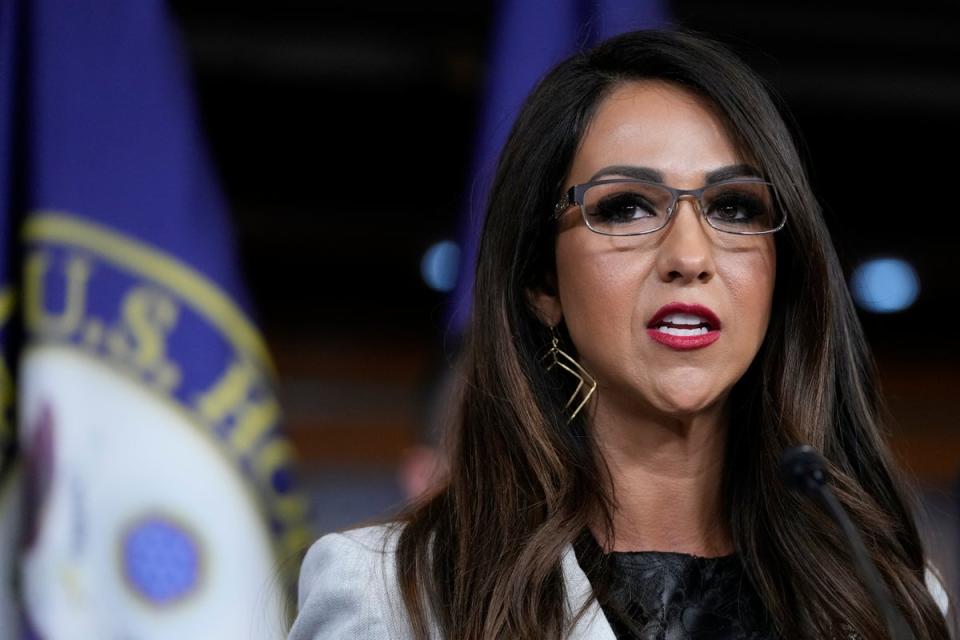
“If you ask people, in my mind, what the number one concern is, or what I hear … that remains how expensive everything costs,” he tells The Independent, listing everything from the price of gasoline to eggs.
“I think a lot of people in DC, from both parties, have missed what the daily struggles are – access to health care, mental and physical,” he says. “We have some of the most remote counties in the country and some of the least well-off counties in the country, and a lot of people are one doctor leaving away from going from a 45-minute drive to a three-hour drive [for health care].
“These are the conversations I’m hearing in the backroads of CD3.”
The issues are complex, multiplying and, inarguably, in need of action as the west and south of Colorado cry out for a representative who will fight to better their lives.
But the seat remains for the taking.
“I don’t think there’s a default candidate at this point,” Prof Gollob tells The Independent. “As voters go shopping for candidates, it’s going to be interesting to see where they settle.”


